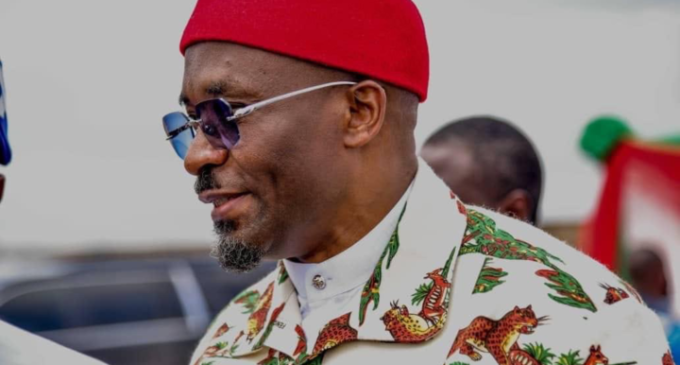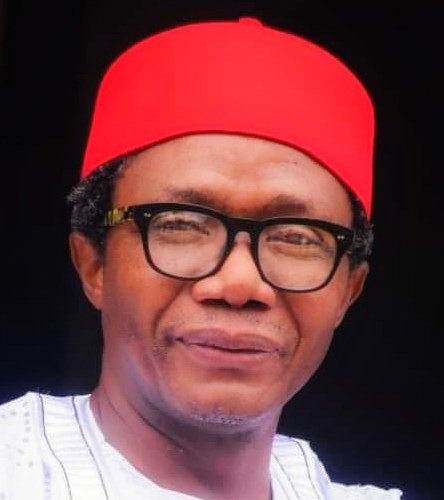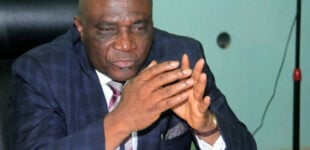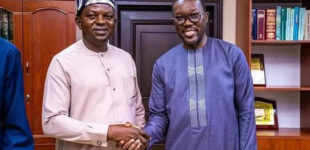Benjamin Kalu and south-east political leadership, development

Leadership determines whether a family, society, or country succeeds or fails. Indeed, everything rises and falls on leadership. The Bola Ahmed Tinubu presidency heralds the rise of a new era in Nigeria and unless this changes at the supreme court and even before then, the south-east has to reposition itself to make the best of it. With the ongoing realignments, geopolitics has become more important than ever, although the south-east has so far had the least of its impact.
States in a federation with a presidential system of government plan how to develop and remain important to the polity from within. Development and security are the two real issues that need to be given their due premiums. But neither of them is possible without leadership, and state-level leadership cannot provide enough security and growth without leadership at the regional level, which the south-east lacks at the moment.
This presumption is so because the nation’s unitary constitution under which the federation is run does not allow the stifled states to have fair control over levers of development. Both the legal frameworks and access to natural resources are under firm federal control.
Furthermore, regional coordination and cooperation are more important than ever given the limited resources available to the majority of the federation’s states, notably the south-eastern states. The federal government retains control over a much larger portion of the authority and resources required to implement regional integration and anchor real development. Because of this, strategic and critical thinkers see any change in the federal government as an opportunity for a fresh start for rebuilding regional leadership and enabling the south-east to benefit from the country’s enduring geopolitics.
The South-East has to be better organised politically as a region within the nation. After all, California, the 6th largest economy in the world, is but only a state in the United States. Without complete regional coordination and coordinated actions, the growing disruptive insecurity—activities of the ESN, UGM, the deep state, cults, Yahoo ritual killers, and kidnappers— and underdevelopment in the south-east cannot change for the better.
Regional economic integration is still conceivable, even with the terrible 1999 Constitution. Though it may be slower and more difficult, it is nevertheless feasible. More powers can be wrested from the exclusive list to promote economic development at the state and regional levels. This is where Rt Hon Benjamin Kalu’s role as the deputy speaker of the house of representatives comes into play.
The deputy speaker represents rank six or seven in terms of hierarchy and protocol in Nigeria. Climbing to the No 7 citizen position of a country is not a small accomplishment, as evidenced by the fact that our population is well over 200 million. However, what matters most is how the occupant uses such a position to benefit his people. This is not the first time the zone will produce a deputy speaker; south-east has produced five senate presidents, a deputy senate president, and even a secretary to the government of the federation in this dispensation alone.
Under this dispensation, the political elites of the zone have not taken adequate action. They abandoned the region to its fate and used their positions to build up their private armies, fame, and wealth instead of concentrating on regional security, integration, and development. They did not demonstrate any genuine care about Ndigbo and the zone’s economy.
In Nigeria, favouritism or any other preferential treatment is not what Ndigbo need or seek. What they want is fair play and a suitable constitutional framework to express themselves as a sub-nationality in the federation.
In addition to serving as the vital link between the south-east and the centre, Benjamin Kalu is in a good position to assist the region in reenacting political leadership. Since the country’s restoration to a new democratic era, this is something that has been lacking in the zone.
The initial step is to adequately define the south-east regional strategic interest, or what the south-east expects from the Nigerian nation-state. Numerous regional demands will necessitate constitution-related changes. For instance, changing the constitution to move ports from the exclusive list to the concurrent list is necessary. If there is a seaport in the south-east, it will, along with security and electricity, certainly ensure the development of the zone into an economic hub and economic tiger.
Thankfully, a new set of governors who will serve as the foundation for the envisaged security and development is now in place. Especially Chukwuma Soludo of Anambra and Alex Otti of Abia state, who are ready to link with the centre for the sake of Ndigbo and the region. Both of them and possibly one or two others, are authentic and have lofty visions and ambitions for the south-east zone.
The great desire of Ndigbo to develop their society and economy has long been self-evident. Before the military coup of 1966 and the ensuing genocide against Ndigbo living in other regions of Nigeria, mainly northern Nigeria, they had a robust economy centred on three key areas: agriculture, trade/commerce, and industry.
Other ethnic groups frequently get the false impression of Igbo inventiveness, innovativeness, and uncommon business acumen as being overly ambitious and domineering. But so are the Jews, Japanese, Chinese, and back home the Yoruba. The Igbo spirit is powered by some key philosophies, namely: ‘Egbe bere ugo bere’ (Live and let live), ‘Onye aghana nwa nne ya’ (Be your brother’s keeper), and ‘Igwe bu ike’ (Unity is strength), which provided the driving force behind the creation and maintenance of the renowned Igbo State Union under the inimitable Chief ZC Obi of blessed memory before the Biafra war.
By pursuing mass education for her people through the Igbo communities, unions, and self-help, Ndigbo were able to close the 30-year educational gap that had existed between the Igbo and the Yoruba for the previous 50 years.
ICT, politics, academia, sports, entertainment, and many other major disciplines have seen considerable advancements among the Igbo in the diaspora. The primary factor in the unusual and quick success of the Ndigbo is their distinctive “yes we can spirit” or “can-do spirit,” which set them apart from most other ethnic groupings.
However, the Nigerian-Biafra conflict of 1967–1970, which reversed more than 50 years’ worth of social, cultural, political, and economic progress, had a disastrous impact on Ndigbo. The outcome of the conflict had a devastating impact on every aspect of Igbo existence. They lost their properties, businesses, bank money, economic viability, and political influence in Nigeria. The ‘No Victor, No Vanquished’ post-war declaration was merely a political statement, as all professed commitments to reconstruct, restore, and reconnect the Eastern Region with the rest of the country were immediately reneged upon. Ndigbo were instead offered the contentious policy of only 20 pounds to only those who could show documentation of bank deposits, regardless of how much money was left in their accounts.
As a matter of unwritten public policy to keep the South-East down and denied access to the world via land, sea, and air for as long as possible, the Eastern Economic Corridor, which was being built by the defunct Eastern Regional Government under the late Dr. Michael Iheonukara Okpara (aka Mike Power), was shut down.
It will take strategic regional leadership and diplomacy to address the structurally based and politically motivated marginalisation of Ndigbo. No Nigerian federal administration has felt the need to address the need to foster the development of Igbo territory, as seen by the stark infrastructure gap between the South East and other zones. In terms of the constitution and structural exclusion, the South-East is the only region having only five states (the North West has seven), and up to 90 LGs in deficit. Yet, States and LGs are the basis for resource allocation in Nigeria as well as quota distributions to federal schools and all federal appointive and elective positions.
The Biafran War’s aftermath unfortunately had a very severe effect on the psychological well-being derived directly from Ndigbo were handled after the war. The ‘Igwe bu ike’ spirit has all but vanished and gave way to the rise in self-destructive individualism motivated by survival. Individualism which is anarchic and narcissistic has taken the place of the famed republican spirit of the Igbo man. To refocus our people, the region needs strategic leadership that will seamlessly connect the zone with the centre.
However, despite the difficult conditions that Igbo people face in contemporary Nigeria, Ndigbo have succeeded in rebuilding their lives to the best of their abilities within the limiting and debilitating circumstances, particularly regarding the social infrastructure—markets, hospitals, schools, etc.—that was destroyed during the internecine civil war.
Unfortunately, as a result, it is thought that only 30% of Ndigbo and Igbo investments are based in Igboland and that the other 70% are outside of Igbo land. The South-East’s new regional political leadership must work to reverse the unwholesome trend. Therefore, Benjamin Okezie Kalu is presented with an opportunity. He was unanimously chosen to serve as the Nigerian House of Representatives deputy speaker and is now in that role. He serves as Bende’s representative in the House.
After completing his studies at the University of Calabar, where he also served as the student union president, Benjamin Okezie Kalu got his start in politics as the PDP’s diaspora leader. He was the youngest local government chairman at the age of 31, according to records. He served as the special adviser to the then-governor of Abia state on local and Chieftaincy affairs. Before then he held the position of senior special assistant to the governor on MDGs and international relations at the age of 35 and chieftaincy affairs.
Kalu, a member of the ruling All Progressives Congress, was elected to the house of representatives in 2019 to represent the Bende federal constituency in Abia state and rose to the positions of house committee on media and public affairs chairman and spokesperson for the Green Chamber. In 2023, he ran again and won, going on to further win the position of deputy speaker.
To rebuild political leadership to support security, regional integration, and south-east development, Kalu, the highest political office holder from the region, needs to forge relationships with the south-east NASS caucuses, as well as with political appointees from the zone and the south-east governors. If he takes advantage of this unique opportunity, he has the necessary experience and is in the right position to succeed.
Law Mefor, an Abuja-based forensic and social psychologist, is a fellow of The Abuja School of Social and Political Thoughts. He can be reached via [email protected]; Twitter: @Drlawsonmefor.
Views expressed by contributors are strictly personal and not of TheCable.















There are no comments at the moment, do you want to add one?
Write a comment